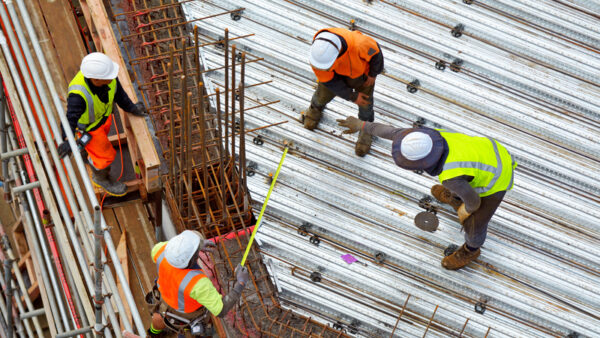When we announced a new course on managing quality in construction earlier this month, I was asked the question, why does the industry need such a course? Shouldn’t it be taken for granted that a construction firm already knows how to build properly? Isn’t it a bit like offering GPs a course on anatomy?
It’s a good question and a fair one to ask, and I will try to answer it.
Somewhere along the way, an institutional acceptance of error has crept into the construction process. There is no other way to describe it. It’s not happening everywhere, but it’s happening enough to ring alarm bells.
What’s more, it’s unlikely that this acceptance of error can be self-correcting without a change in culture such as we’ve undergone for safety and health.
It’s a personal thing for me. When Professor John Cole published his report in February last year into the defects that caused the closure of 17 schools in Edinburgh, I simply could not understand how so much could have gone wrong. It turned out to be the tip of the iceberg, as defects were found in 71 more schools across Scotland.
At about the same time, it emerged that house builder, Bovis, was setting aside £7m to correct defects in new build homes sold to customers.
The catastrophic fire at Grenfell Tower in London, which claimed the lives of 72 people, was a clarion call for fundamental change in the way buildings are designed, procured, constructed and managed.
It dawned on us that these problems were not just isolated events, but instead were systemic. So, we launched a Commission of Past Presidents to consider what steps were needed to address the issue.
In gathering evidence, we surveyed the industry, and the response pointed overwhelmingly to the need for top-to-bottom change. 82% of respondents said workmanship suffers because of poor management of quality, whilst 84% said signing off work is compromised by the same.1
This proved what we suspected: that time and cost considerations have pushed quality to the back of the queue, and inherent industry systems and culture may be too weak on their own to restore quality as a priority.
In response, the Commission settled on two broad strategies. One is to publish a Code of Quality Practice that will set the standards we should be achieving as an industry. We will be releasing more information about that later this year and consulting with industry during early 2019 to ensure we get it right.
The other strategy is education. We want to raise awareness of the issue of quality management and give people the practical tools to manage it.
The course that we announced earlier this month is part of that process, but over the coming year we will be developing a competency-based qualification which will build on the course and which we hope will help reintroduce to the industry the knowledge and expertise that has been lost with the decline of the clerk of works role.
This won’t be easy. I know it’s trite always to hark back to the good old days, but when I started in the industry 35 years ago, like everyone else, I learned from more experienced people, who only had to look to tell if something wasn’t right.
How to recover that is not immediately clear, but we can’t use the past as an excuse. Things move on. The industry has changed, in many ways for the better.
We don’t need more process for the sake of it, more box-ticking, more theory. An over-reliance on process, box-ticking and theory is part of the problem. Somehow, at the top, companies need to recognise that there are things they don’t know, and do not adequately control, and work from there.
And yes, GPs need CPD too, even in anatomy, as research and medical techniques advance.
Image: Paul Nash, past president of the CIOB and chair of the CIOB Quality Commission (CIOB)
- Edited 24 September 2018 to correct the month of the publication of Professor John Cole’s report
Comments
Comments are closed.







This situation also exists in the Caribbean. Similar steps are also contemplated to mitigate the challenges which will occur if the situation is not addressed. We shall be pleased to contribute to this initiative by sharing best practices
I seem to recall a very simple campaign several years ago on the same subject.
It carried the simple slogan GET IT RIGHT FIRST TIME
Totally agree, quality needs to be enforced from the second designers get contracts and also when a main contractor steps onto site, a lot of the time MC’s have a generic quality plan submitted at tender stage but the QA and QC promised in this document are rarely met during construction phase. What should be enforced is a construction phase quality plan that is updated as the project progresses similar to the Construction Phase Health and Safety Plan. CDM regs were supposed to control this but the majority of the time the contract administrators and contract managers are not educated in their requirements and what is expected from them so quality fails from an early stage and ends up in a huge legal fight at the end.
Hi Paul, It is a very concerning that the resulting lack of quality in the end product is following involvement of companies and organisations who themselves are ISO qualified and supposedly have processes in place to ensure quality is achieved.
The writing was on the wall with both millers and Jarvis construction driven by their management culture and government cuts. Having just retired from this industry as a chattered professional having entered it at 17 as an apprentice then all I see is an industry still without its own stand alone government department tho I did try my best to achieve this goal with John Prescott. We are a forgotten industry as we have no exports and are view by educationalists as a dumping ground for underachievers’ and struggling students.As an industry we have never ever sold ourselves to the youth of the day and T&C’s of employment are atrocious. Unless we change the above and our culture we will not rise above this pit of despair.
This problem is pandemic. It stems from a breakdown in moral values, virtue, and goes back to poor parental training. Trying to Instill the need for quality starts with changing the ethos of the inner person, to feel self respect, to care, to have a measure self pride. Fixing this in those that it’s already found missing is difficult. Select those that have these qualities and build your business around such ones.
Sadly I don’t think the industry and the client’s fully understand the importance of quality, in that quality means longevity, but owing to cost cutting exercises in material sourcing, training etc…, sadly means that, ‘cheap in’ equates to ‘cheap out’. I recently did extensive research into why has there been a decline in quality within the construction industry and uncovered what is causing it, this was also peer reviewed by the ICWCI with three of the members agreeing with my findings.
One of those days the powers that be will get it right
I have recently immigrated to New Zealand from the UK and NZ had a massive problem with ‘leaky buildings’. A system of producer statements were introduced to try and mitigate this and other quality problems. Initially a PS1 has to be produced with the calculations, technical design and to demonstrate code compliance, this is then peer reviewed as part of a PS2, then once constructed the company constructing issues a PS3 to confirm it has been built in accordance with PS1 & 2, then a independent PS4 is issued to confirm the process.
Whilst bureaucratic it does ensure that companies and local authorities ensure quality. The law is different in NZ, liability for defects is joint and several, so local authorities as well as design team and contractors are all liable in the event of an issue, so it becomes a case of ‘last man standing’ foots the bill. That would certainly focus the mind of Building Control inspectors in the UK.
There is an over emphasis on the adoption of new technologies, especially BIM, and off-site manufacture, as if these are a magic wand to solve the problems of quality and longevity. The adoption of Lean Construction principles by firms and the ‘Corporate Inclinations’ of the Professional Bodies might also be affecting our attitudes to quality. The construction industry should not forget that its roots lie in craft based skills, such as stone-masonry, carpentry and joinery. In the race to become adept at using computer generated algorithmic equations to solve the industries problems, we have forgotten our roots and lost a lot of knowledge.